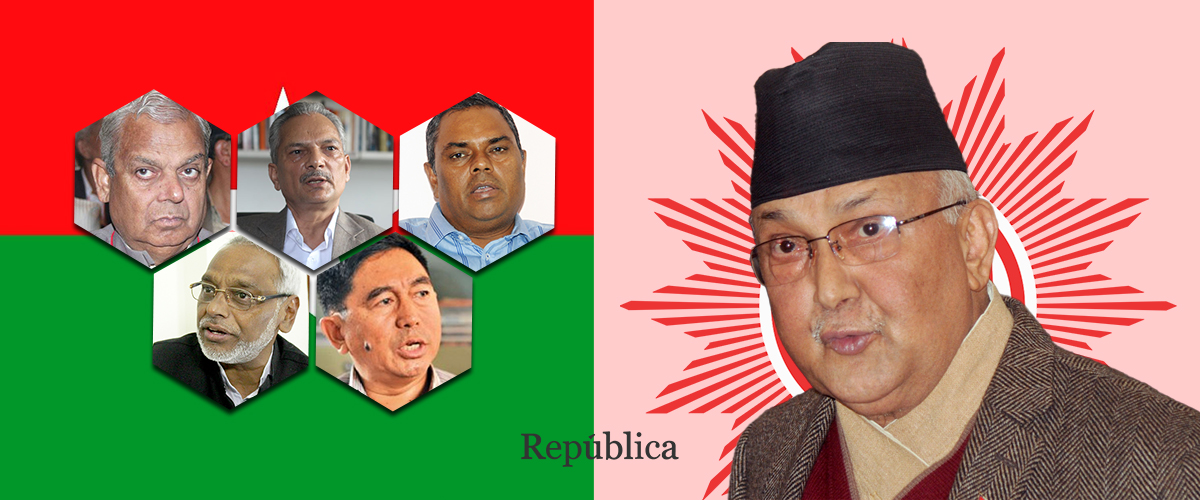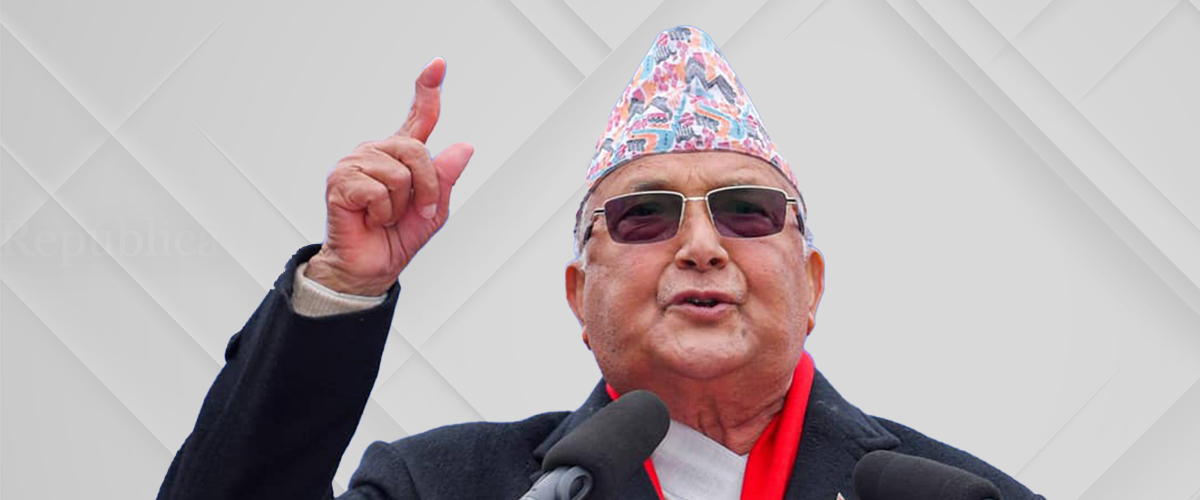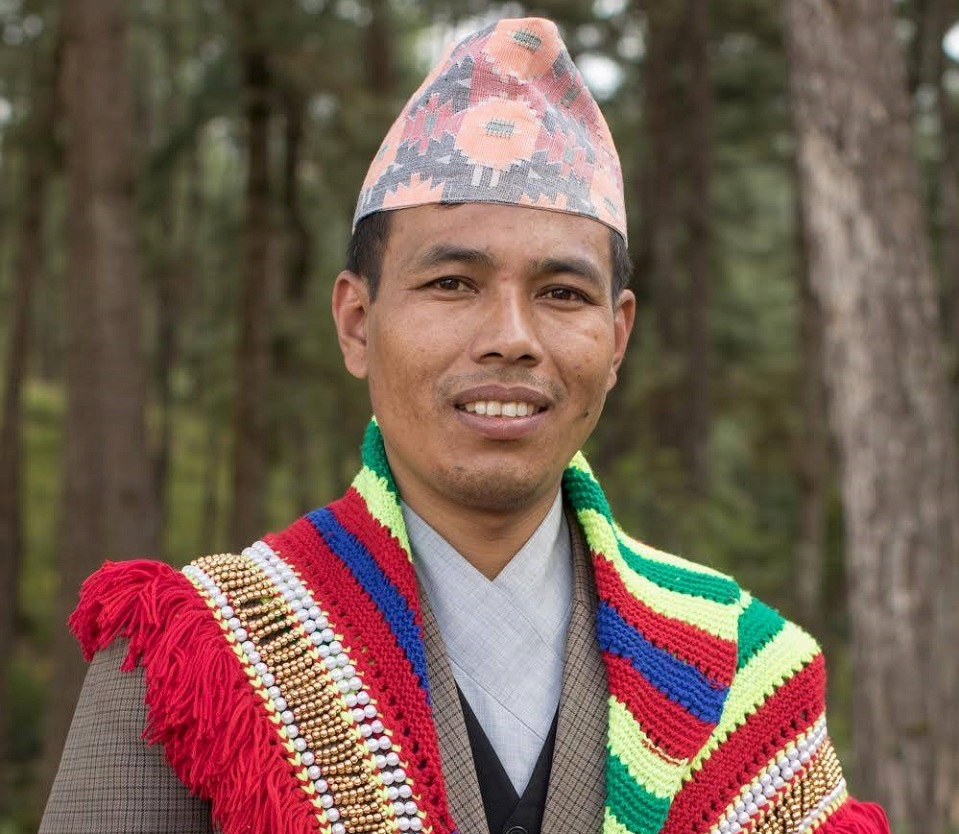The unabashed dislike of PM KP Oli by civil society ‘stalwarts’ has not proved enough to dislodge Oli, so what is their Plan B?
It has been several months since some of Nepal’s celebrated opinion-makers and a section of the media revealed, with admirable honesty, their innate, and in some cases acquired, appetite for pushing the society towards political misadventures.
Their Inexplicably silly, feeble,and unnecessary street performances christened and advertised – in apparent coordination with Pushpa Kamal Dahal –as ‘brihat nagarik andolan’,or ‘great people’s movement’,turned out to be a damp squib. The campaign was meant to launch and advance the career of some individuals who have been romanticized by the name and fame of ‘civil society stalwarts’ of the First and Second People’s Movement, but it turned out the trampoline had a hole in it. And so the announced people’s movement fell flat, at least as far as the general public’s trust is concerned.
The ‘great people’s movement’, termed by some as the ‘third people’s movement’,was certainly a misnomer, an effort to capture undeserved public recognition. Those who enthusiastically announced the ‘third people’s movement’ understood neither political science nor sociology,and believed that such a movement could be sparked by simply using populist terminology or flipping a switch. Whereas the people’s movements of 1990 and 2006were spontaneous affairs, and those who happened to be by got to ‘lead’.
The gadflies of the ‘third people’s movement’ sought to capture the leadership of the people by vilifying to the hilt a duly elected executive head whose decision to dissolve the Parliament was under review at the Supreme Court.As it turned out, try as much as the romanticized mainstream media might to highlight the civic ‘actors’, the call did not resonate with the vast majority of citizens, who, from the very beginning, quietly hoped that sense would prevail and that the performers would understand how embarrassed the spectators were.
Down to a Whimper
Despite the public’s disinterest, and despite so many credible public faces staying away, the performers plodded further into the quicksand of humiliation. By late-March, the ‘greatness’ of the ‘movement’ was down to a whimper, but a performance nevertheless had to be put up. And so they called a ‘brihat bhela’ at the outdoor dabali of the Academy at Kamaladi, no matter that about half of the attendees of 150 seemed to be media people directed by their editors to give full play to these performers.
There are no more than a handful of individuals who have cynically sought to ‘lead’ the people during this latest episode, starting with the dissolution of Parliament by Prime Minister KP Oli and ending with the two Supreme Court decisions. They have tried to create an impression of constitutional crisis even though the Constitutional Bench was engaged with the issue and everyone was agreed and willing to abide by the decision. This handful was also unmindful of the principle of letting sub judice matters lie – in fact they were keen to try and intimidate the justices, one of the seniors even saying that “the public would drag the judges down the streets” if they did not decide against dissolution.
It is the work of this handful, supported by prejudiced or unknowing reportage of the media, that gave the world the impression that after dissolution Nepal was headed towards authoritarianism and military takeover when the facts on the ground did not indicate so and the public was hardly agitated.
By late-March, even the ranks of the ‘stalwarts’ had diminished, but that did not stop them from organizing the meeting at the Academy dabali. The would-be opinion makers acting pretentiously as the twin-priests of the national conscience – one a professor of political science and the other an editor transitioning to civil society stardom – continued with their public display of trouble-mongering. They spent the entire afternoon under the hazy Kathmandu sky brainstorming with four politicians about how to chart out a second plot to oust Oli.
The event, live streamed by some online news portals and given undue space by the mainstream editors, would convince any unsuspecting observer that Nepal’s intelligentsia and politicians have just one problem to deal with – the incumbent prime minister. While the rest of the world is having to deal with quaint challenges such as the pandemic, the economy, dipping employment, geopolitical challenges, and so on, Nepal’s problem is evidently limited to the visage and person of Khadga Prasad Sharma Oli. Since getting him out of his chair at Singha Durbar and sofa at Baluwatar was not possible through parliamentary process, the best way was to try and rouse the rabble through populism.That was the game plan.
Photo exhibition marking indigenous lifestyle

Search for ‘Plan B’

To close watchers as well as the bemused public, though, the dabali panchayat aim to absolve Dahal, Madhav Kumar Nepal, and thedabali’s ringmasters themselves of their reckless disregard for constitutionalism as well as the people’s will expressed in the general elections in late 2017 was glaring. Speaking on the one-point agenda of an Oli-ouster, the ringmasters seemed to have no qualms of being seen to be siding with Dahal and, what we must sadly say, his sidekick Nepal, and throwing suggestive questions their way. Mahanta Thakur of Janata Samajwadi Party and Minendra Rijal of Nepali Congress were not taken in by this subterfuge, however, and failed to serve the ringmasters’ agenda. Which is when they decided to call on two ‘civil society stalwarts’ in the audience as if they represented the public at large rather than the very agenda of Dahal and Nepal.
The Dabali Performance certainly offered an oblique concession to the fact that that ‘Plan A’ to throw Oli overboard had failed, and that the entire crew of street performers was now in need of rescue.Fortunately, that rescue did not arrive, not from Thakur nor Rijal, nor from the larger public.
Unsurprisingly, the best brains’ of the nation, to borrow from Dahal’s speech in the same event,used the platform with the single-minded objective of extracting public commitments from Thakur and Rijal to, on behalf of their political parties, join hands with Dahal and Nepal for mounting a ‘Plan B’ against Oli.
The rescue of Dahal, Nepal and the would-be stalwarts certainly requires a ‘Plan B’. Unfortunately, no one knows what ‘Plan B’ is.
Oli is still in command of the narrative, and in place. The pandemic is once again rearing its head via the southern border. The economy needs to be revived, employment created in-country, Beijing’s closure of the northern border needs to be challenged, and the ‘pointy map’ matter still hangs fire. What, indeed, could be the formula to divert the public away from all of these critical issues, and back to the single-point ‘oust-Oli’ agenda?
Pushpa Kamal Dahal, the main person behind ‘Plan A’ seems to be directionless, and even his followers have begun to question his much-publicized skills as a master-strategist.
The master’s skills are not visible since he cut his strings with Oli and tried to dump the latter utilizing the Secretariat of the erstwhile NCP.
Dahal would go back to the jungle if he could, but that is not an option because few would follow him, and it would also mean that he bid goodbye to the luxurious and comfortable life he is used to as well as the many billions he has in safe-keeping with selected persons.
And so he was reduced to half-heartedly making a ridiculous petition before the Supreme Court to reverse its ruling that broke the NCP into the Maoist Centre and UML giving them the option of voluntarily re-uniting but under another name, because ‘NCP’ was taken.
By the looks of things, the country is headed for the polls in the autumn. Nothing akin to a ‘Plan B’ seems to be unfolding, and the ‘stalwarts’ are awaiting instructions from Pushpa Kamal Dahal. But Dahal is preoccupied, desperately seeking a place from where he may win a seat in Parliament.It will not be Chitwan or Siraha, so he is eyeing Rukum.
Man of Flaws

Prime Minister Oli is certainly a man of many flaws. He is excessively loquacious and has been prone to being unnecessarily reactive to criticism he could have ignored. He evokes strong emotions in people, and some of those emotions can be very negative. He is also known for being dismissive of advice and protective to a flaw of those close to him.
At the same time, Oli is the most plain-speaking politician in Nepal today, and the most adept at helping navigate the nation in these times of heightened geopolitical sensitivity. Oli has raised the bar on how a Nepali head of government deals with the two neighbours China and India, as evident in his interview with the Indian television anchor Sudhir Chawdhary. Recently, Nepal broke away from ‘SAARC solidarity’ to abstain on the matter of the Sri Lanka vote at the UN Human Rights Council, and it has been able to maintain a principled voice on the Myanmar general’s coup.
Oli is not only articulate, but also the most gifted orator among Nepal’s politicians and he has used this gift abundantly in international platforms in Nepal’s interest. With his health stable once more, following his second kidney transplant,Oli is better positioned to hold office than earlier during his current term.
Often when Kathmandu’s opinion-makers laugh at KP Oli’s speeches, they fail to realize that he is speaking over their heads to the public at large, trying to mould opinion his way when the media is almost overwhelmingly arrayed against him.
Nepal’s handling of the rampaging pandemic, at least in terms of vaccine introduction and inoculation, has been outstanding and has been generously and deservedly praised abroad while Nepali commentators have been stingy and frugal in their words of praise, if any.
We just got water from Melamchi flowing from our taps after years of corruption and sabotage, but the response has been lukewarm at best, as though Kathmanduites were aggrieved that this decades-old butt of jokes was not available anymore. The same is bound to happen when the Upper Tamakoshi hydropower station takes Nepal into the energy-surplus era – the public will get confused because the opinion-makers and civil society will not exult as they should!
A secessionist movement that could have escalated to a territorial threat was skillfully defused. The last vestige of an unnecessary ‘people’s war’ was recently handled exactly as it should have been. Nepal adopted a new map including territories encroached by India.There is certainly plenty to appreciate here, but you would not know it if you were to read most of the media reports, editorials, blogs, cartoons, and public posts by known personalities.
It is certainly worth contrasting the bowing response of Indian media to PM Narendra Modi, and across-the-board media opposition that PM Oli confronts.
A Mourning Hall
Whichever way we crunch the numbers in the reinstated Parliament that Speaker Agni Sapkota has turned into a mourning hall, it is highly unlikely that the wishes of those behind the failed ‘great people’s movement’ will materialize. It is ironical, from the point of view of those that dislike Oli with nuclear intensity, that his voice happens to be the loudest in favor of early elections. After all, why would someone so plainly ‘bad’ take the risk of standing the ultimate test of elections?
The questions arise: Why not let voters decide how flawed KP Oli is? Why not go for early elections instead of wasting the nation’s valuable time in cobbling together and bringing down coalitions just for the heck of it?
They are questions that should be asked of the self-appointed stalwarts of civil society as they stay at home licking their self-inflicted wounds to the ego.
-Bikash Sangraula is a Kathmandu-based journalist and author.
Email: writerbikash@gmail.com
Twitter: @SangraulaBikash







































